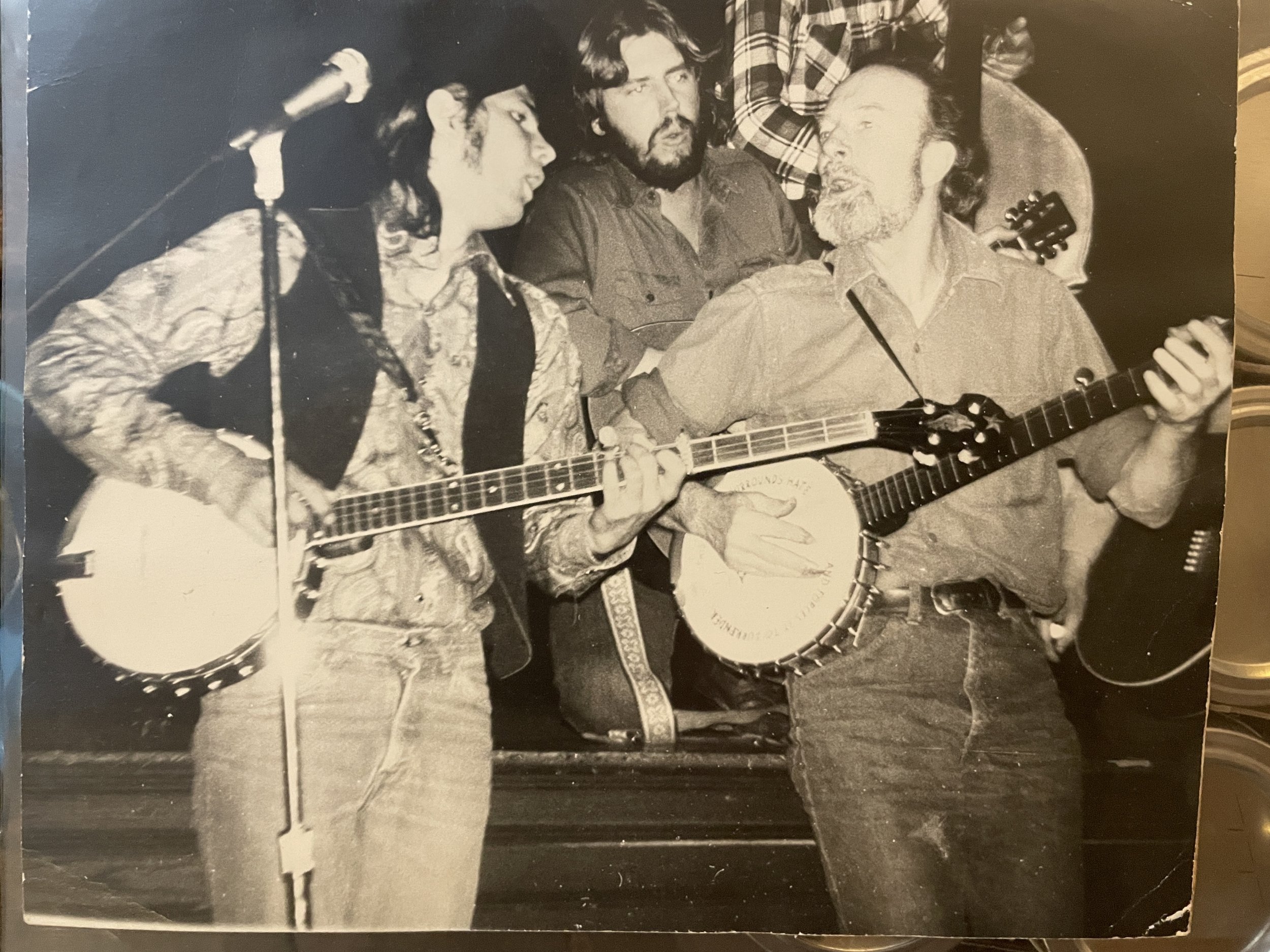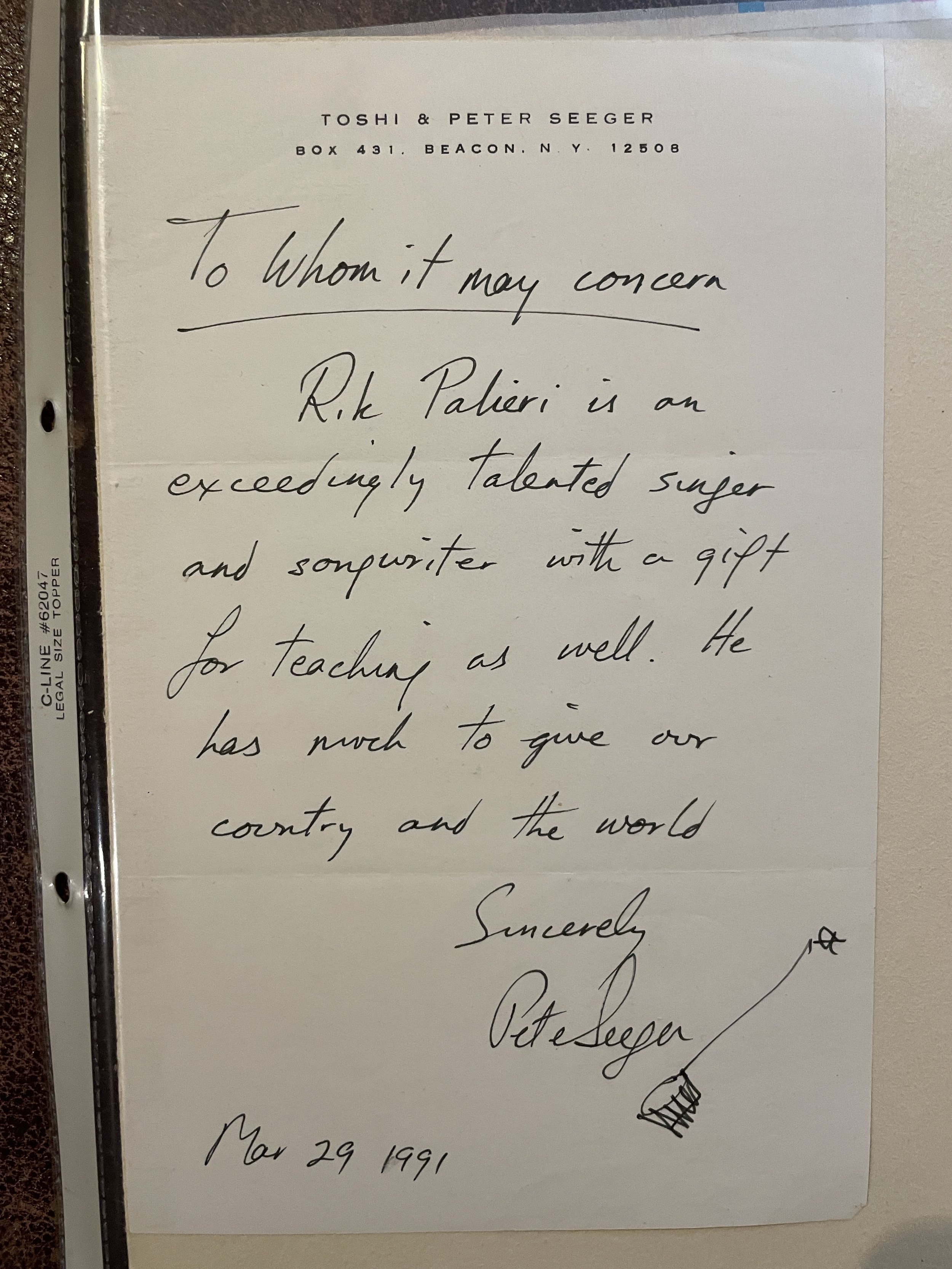Traditional Arts Spotlight - How to Play the 5-String Banjo
Mentor Artist: Rik Palieri
Apprentice: Jason Baker
Traditional Artform: The “Pete Seeger” style of banjo playing
The 2022-2023 ‘cohort’ of the Vermont Traditional Arts Apprenticeship Program included 12 collaborations between mentor artists and apprentices who worked together to keep traditional cultural expressions vital and relevant to the communities that practice them. With funding from the National Endowment for the Arts and a longstanding partnership with the Vermont Arts Council, Vermont Folklife initiated this program in 1992 to support the continued vitality of Vermont's living cultural heritage. In this ongoing series of Field Notes we’ll introduce you to recent program participants and the traditional art forms they practice. Vermont Folklife has been documenting the work of participants in the Apprenticeship Program since its inception. These interviews and audio-visual records are part of an ongoing collection in our Archive centered around traditional arts, music, and trades.
This note features interview excerpts, audio, and photos from a recent site visit VT Folklife staffer Mary Wesley had with mentor artist Rik Palieri (Hinesburg, VT) and his apprentice, Jason Baker (Burlington, VT).
Rik and Jason in Rik’s home music room
Rik Palieri and Jason Baker spent their apprenticeship year together with banjos on their knees exploring what Rik describes as the “Hudson River School of music,” emanating from the luminary music of Pete Seeger. Over the past 50 years Rik has played and performed music all over the world. He sings and performs both original and traditional songs on a variety of folk instruments, including the banjo. A longtime musician himself, Jason had already known and collaborated with Rik for a few years when they decided to focus on the banjo.
Countless people have learned the instrument through Pete Seeger’s iconic instructional booklet “How to Play the 5-String Banjo,” but Rik had a longtime personal connection with Pete as a friend and a mentor. He drew on this experience when working with Jason. Incorporating personal experience and stories into the context of teaching an artform is a hallmark of an apprenticeship.
Mary: Is this the first time you've done an apprenticeship or a teaching endeavor that's so focused on creating that throughline from what you had with Pete?
Rik: Yes. I've showed people things, all the time, but this is the very first time that I opened up my life and tried to share it in this way of really trying to give an experience of who the man was and how important he was.
Mary: And how has it been to receive that?
Jason: It's been an amazing experience to actually get to know Rik in general, and for me, a great learning experience. One of the things you [Rik] told me that Pete said in one of the last visits you had was, this is not the very last visit, but at one point you were trying to leave and he kept pulling you back. And at one point he said, he just out of the blue said, "You're still singing the old songs, right? You're still singing the old songs. You're keeping the old songs alive." And I think that actually I want to eventually write a song about that. That's the sort of core of the idea. And that one element of what Rik has shown me. And then another element is actually from another mentor of his, Utah Phillips, who you mentioned—the Well of Tradition. He was talking about how some of the songs spill out, you know they leave, and that it's important to put new songs back in that are for the community. In other words, that are for people to sing together or to share. The definition of that can be argued, but essentially that he felt that folk songs needed to be refreshed. And so there's these two elements of preserve tradition and create something new. And of course, “the tradition" has always been about adapting, changing, doing your own version of it.
In addition to performing and teaching Rik has also dedicated much of his career to documenting the voices and histories of many key figures in the American folk music tradition and revival. Interviews created in the field and through his Vermont Community Access television show Songwriter’s Notebook, are archived at the Library of Congress.
During the site visit, which took place in his home, Rik shared photos and letters collected and cherished over his decades-long friendship with Pete. During the interview Jason asked him to retell the story of his first meeting with Pete:
Rik: So, you know, I had the book and I was learning how to play the banjo. And so there were a lot of Pete Seeger records and things around the house. And my sister Lisa, who's 11 years younger than myself, she was born on my birthday, and she would catch Pete on Sesame Street. So she would remember seeing Pete.
I had not really met Pete yet, at this point. I saw him in concert and I told Jason that the first time I saw him at Rutgers at Douglass College, and I went backstage and I said, "Pete, why do you play the banjo?" And he said, "Because I like the tone." And he talked to me. And that was the beginning. For, you know, a 15 year old kid, that meant a lot that he talked to me. And he talked to me just like he would anyone else. And I started learning more and more. Really like I said, reading this book, like a Bible every night, reading different things and going to shows and seeing Pete play and joining the Sloop Clearwater. And so I got involved with the Clearwater, and I would see Pete, but I was very shy, so I didn't really go over to him.
And then he was playing over at Central Park with Arlo Guthrie, and I was going to go that night and that day my mother took my sister Lisa and our younger sister, Tina. They went into Central Park and they saw everybody setting up all their blankets. They said, "Well, what are you setting up for?" “Oh, Pete Seeger and Arlo Guthrie are playing tonight.” Now, my sister Lisa thought, well, Rik really must know Pete Seeger, the only he's got all these records, he must be backstage with them right now. So she bolted away from my mother and she took Tina, and they went over to the guard. And somehow she got backstage and she met with Pete and Toshi. And she was talking with Pete and Toshi, and I wasn't there. So I didn't really know to this day because she left and she said, “Well, you know, some magic took place there.”
And it did. Because what happened? He played that show that night, it was a great show, I was there. And then at the show he said, “Well, tomorrow we're going to have a Clearwater event in Hoboken, New Jersey. Everybody's welcome.” Well, I was all excited. I got up that morning, you know, the next morning, and I took my banjo. I'm walking out the door and my sister Lisa said, “Do you know that Pete Seeger files his nails?” And I was like, "What?" I had no idea of this meeting. So I went over and there was a group of young people, probably about my age or maybe a little bit older, and they were standing around with guitars. Now, this is at the Clearwater event.
So I took out my banjo and I was playing along with them and who comes over but Pete. He takes his 12-string guitar out of the case, and he starts playing along and he's smiling. And this is a big moment for me. I'm 19 years old and there is Pete Seeger playing along with me. And the music stops. And Pete looks directly at me and he goes, “I haven't seen you before. Who are you?” And I kind of stumble, “I'm Rik Palieri.” He said, “Rik, I met your sisters yesterday.” I said, “What?” He said, “I met your sisters yesterday. They told me you were a good banjo player. Why don't you come up on stage and we'll play a couple of songs together?” And he brought me up on the stage and we played old Joe Clark and we played Cripple Creek. And just the two of us, just two banjos. And then that was the beginning. Then Pete started calling me up. He would call me up, you know, “Rik, you should get involved. Get more involved with the Clearwater.” And I did!
It’s clear that Jason’s involvement with Rik and with the banjo is only getting started. As a result of the apprenticeship he has created a new CD to document his work with Rik. He’s already imagining how he can incorporate what he’s learned into his other musical expressions, perhaps adding them back into the “Well of Tradition.”
Here’s Rik and Jason playing the song “Old John Henry:”



